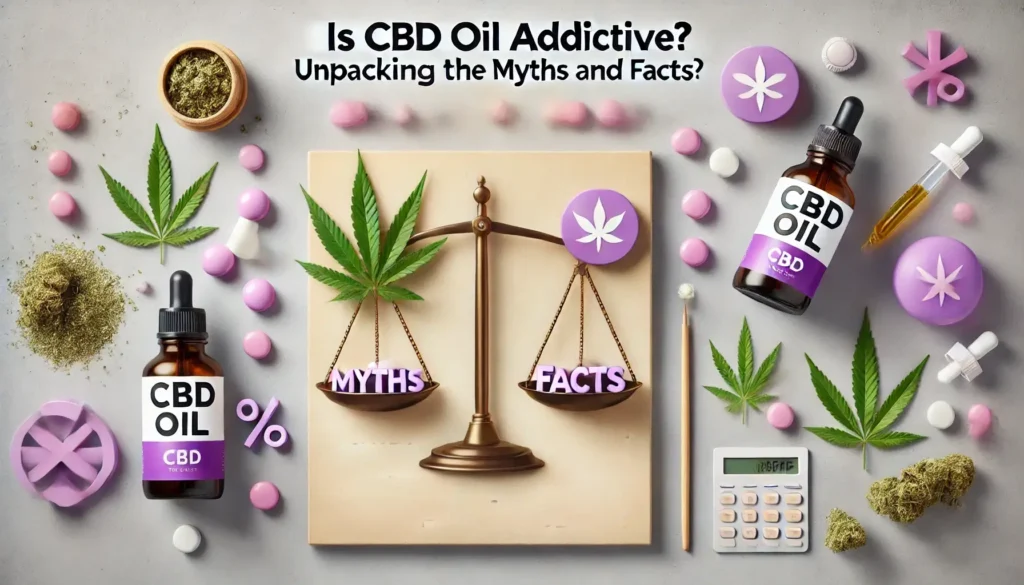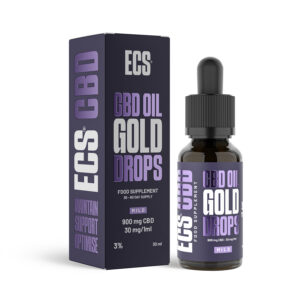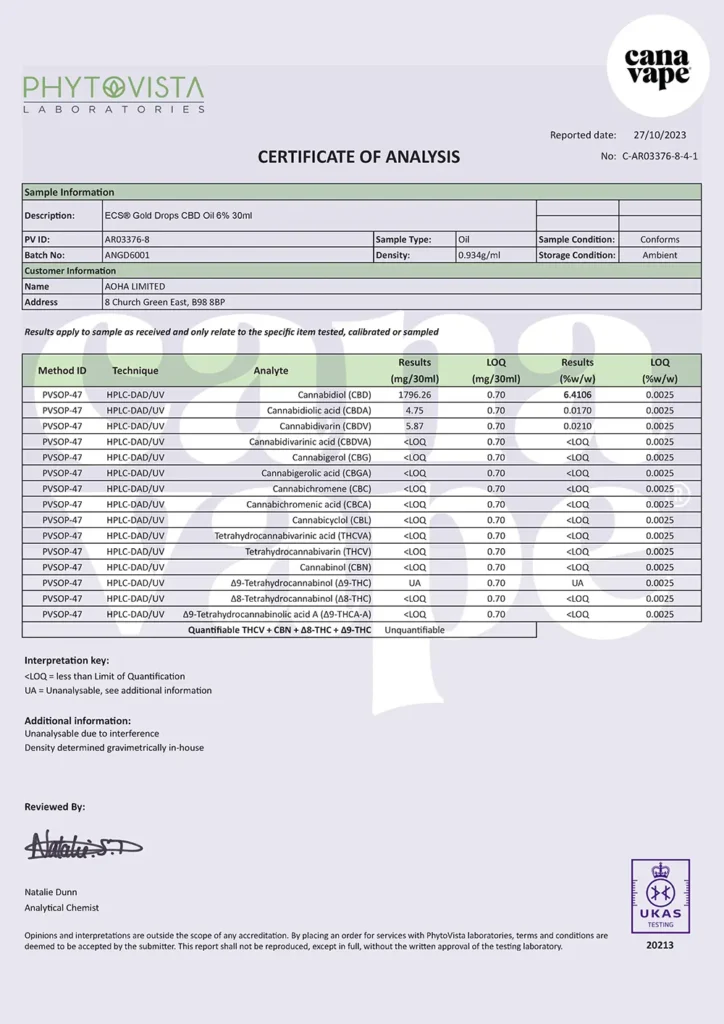
CBD oil has surged in popularity, touted for its potential health benefits and natural origins. However, amid its rise, a pressing question remains: is CBD oil addictive? This concern stems from its association with cannabis, a plant often linked to addiction and misuse. In this document, we will delve into the myths and facts surrounding CBD oil, examining its properties, effects, and the scientific evidence regarding its potential for addiction. Join us as we unpack the truth about whether CBD oil is addictive, providing you with a clear and practical understanding of this increasingly popular product.

CBD oil is a natural extract derived from the cannabis plant, specifically from hemp varieties containing high levels of cannabidiol (CBD) and trace amounts of tetrahydrocannabinol (THC). Unlike THC, the compound responsible for the psychoactive effects of cannabis, CBD is non-intoxicating and is believed to have various therapeutic properties. The oil is typically extracted using methods such as CO2 extraction or ethanol extraction to ensure purity and potency. It is then mixed with a carrier oil, like coconut or hemp seed oil, to create the final product. CBD oil is commonly used for its potential benefits in managing conditions such as anxiety, chronic pain, and sleep disorders. It is available in various forms, including tinctures, capsules, and topical applications, making it a versatile option for those seeking natural wellness solutions.
The production of CBD oil begins with sourcing the right hemp plants, which are specifically cultivated for their high CBD and low THC content. To extract CBD, the most common method used is CO2 extraction. This process involves using pressurised carbon dioxide to pull CBD and other beneficial compounds from the plant material. CO2 extraction is favoured for its ability to create a pure and potent product without using harmful solvents. Another method is ethanol extraction, where alcohol is used as a solvent to extract CBD. Once the CBD is extracted, it is further refined to remove impurities and other unwanted compounds. The resulting CBD concentrate is then blended with a carrier oil, such as MCT oil or olive oil, to produce the final CBD oil product. This mixture helps improve the bioavailability of CBD, making it easier for the body to absorb and utilise.
CBD oil is increasingly used for a variety of health and wellness purposes, thanks to its non-intoxicating nature and potential therapeutic benefits. One of the most common uses is for alleviating anxiety and stress. Many users report a calming effect that helps them manage daily pressures more effectively. Additionally, CBD oil is often used to address chronic pain and inflammation, with some studies suggesting it may reduce pain in conditions such as arthritis and multiple sclerosis. Sleep disorders are another area where CBD oil is frequently applied, with users finding it helps them achieve better quality rest. Furthermore, CBD oil is being explored for its potential role in managing symptoms of neurological conditions like epilepsy, with some evidence supporting its efficacy in reducing seizure frequency. These varied applications make CBD oil a popular choice for those seeking alternative or supplementary treatments to conventional medicine.
There are several myths surrounding CBD oil, particularly concerning its potential for addiction. One prevalent misconception is that CBD oil can get you ‘high’ because it is derived from the cannabis plant. However, CBD itself is non-psychoactive and does not produce the euphoric effects associated with THC, the main psychoactive compound in cannabis. Another common myth is that all cannabis products are inherently addictive. This belief stems from the stigma surrounding recreational marijuana use. Unlike THC, CBD has not shown any addictive properties in scientific studies. Some people also mistakenly think that CBD oil can lead to a positive drug test result. While most CBD oils contain trace amounts of THC, the levels are typically too low to cause a positive drug test when used as directed. These myths contribute to misunderstandings about CBD oil and its safety profile, making it essential to rely on scientific evidence when considering its use.
The scientific evidence on CBD oil and addiction is reassuring. Multiple studies have explored whether CBD has addictive properties, and the consensus is that it does not. For instance, the World Health Organization (WHO) has reported that CBD exhibits no effects indicative of any abuse or dependence potential. Moreover, research suggests that CBD may even possess anti-addictive properties. Studies have shown that CBD can help in managing withdrawal symptoms and reducing cravings in individuals addicted to substances like opioids, alcohol, and nicotine. This positions CBD as a potentially valuable tool in addiction treatment and recovery. Clinical trials and research continue to support the safety profile of CBD, indicating that it is well-tolerated by most individuals with minimal side effects. Therefore, the prevailing scientific evidence strongly suggests that CBD oil is not addictive and may even offer benefits for those struggling with addiction.
When comparing CBD with other substances known for their addictive properties, the differences are stark. Substances such as nicotine, alcohol, and opioids have well-documented addictive potentials, leading to physical dependence and withdrawal symptoms. In contrast, CBD does not interact with the brain’s reward pathways in the same way these addictive substances do. Unlike THC, which binds directly to CB1 receptors in the brain to produce psychoactive effects, CBD’s interaction with the endocannabinoid system is more indirect and does not result in the ‘high’ or potential for misuse. Furthermore, CBD lacks the withdrawal symptoms and tolerance development seen with addictive substances. This is supported by research indicating that individuals can use CBD products regularly without experiencing the cravings or compulsive behaviours associated with addiction. As a result, CBD stands apart from these substances, making it a safer option for those concerned about the potential for addiction.
CBD oil is widely used in the health and wellness sector due to its potential therapeutic benefits. One of the primary uses is for managing anxiety and stress. Many users find that CBD helps them feel more relaxed, reducing the symptoms of anxiety disorders and improving their overall quality of life. Additionally, CBD oil is popular for its pain-relieving properties. It is frequently used by individuals suffering from chronic pain conditions, such as arthritis or fibromyalgia, to help alleviate discomfort and improve mobility. Another significant area where CBD oil is making an impact is sleep health. People with insomnia or other sleep disorders often turn to CBD oil as a natural remedy to enhance sleep quality and duration. Moreover, CBD oil’s anti-inflammatory properties make it beneficial for skin health, and it is commonly used in skincare products to combat conditions like acne and eczema. These diverse applications highlight CBD oil’s versatility in promoting overall well-being.
CBD oil is gaining traction in the realm of mental health for its potential to aid in managing various conditions. One of its most notable applications is in the treatment of anxiety disorders. Studies suggest that CBD can reduce anxiety by affecting serotonin levels in the brain, leading to a calming effect without the side effects associated with traditional anxiolytics. Beyond anxiety, CBD oil is also being explored for its potential benefits in managing depression. Some research indicates that CBD may help improve mood by interacting with the brain’s endocannabinoid system and influencing neurotransmitters related to mood regulation. Additionally, CBD oil is being studied for its potential role in alleviating symptoms of post-traumatic stress disorder (PTSD), where it may help reduce nightmares and promote sleep quality. While research is still ongoing, these promising findings suggest that CBD oil could become a valuable tool in the mental health toolkit, offering a natural alternative to pharmaceuticals.
The use of CBD oil for pain management is one of its most well-documented benefits. Many individuals turn to CBD oil as a natural alternative to traditional painkillers, which can often have significant side effects or potential for addiction. CBD interacts with the body’s endocannabinoid system, which plays a role in regulating pain perception. By influencing receptor activity, CBD may help reduce inflammation and alleviate pain. This makes it an attractive option for those suffering from chronic pain conditions such as arthritis, multiple sclerosis, or neuropathy. Moreover, CBD oil is being examined for its effectiveness in managing acute pain resulting from injuries or surgeries. Users often report experiencing relief from discomfort and improved mobility without the sedative effects associated with some pain medications. While more research is needed to fully understand its mechanisms, the potential of CBD oil to provide pain relief continues to garner interest in both scientific and consumer communities.
While CBD oil is generally considered safe and well-tolerated, it is not without potential side effects. Some users might experience mild reactions, including drowsiness, dry mouth, or changes in appetite. These side effects are typically not severe and often diminish as the body adjusts to the supplement. More rarely, individuals may experience gastrointestinal issues such as diarrhoea or nausea, particularly when taking higher doses. Additionally, CBD can interact with certain medications, potentially affecting their efficacy or causing adverse reactions. It’s important for users, especially those on prescription medications, to consult with a healthcare professional before incorporating CBD oil into their routine. Furthermore, the quality of CBD products can vary significantly, making it crucial to purchase from reputable sources. Ensuring the product has been third-party tested for purity and potency can help mitigate risks associated with contaminants or incorrect labelling, thereby promoting a safer experience with CBD oil.
Navigating the legal landscape of CBD oil can be complex, as regulations vary significantly across regions. In the UK, CBD oil is legal, provided it contains no more than 0.2% THC and is derived from an approved industrial hemp strain. However, it must be marketed as a food supplement rather than a medicinal product, unless it has received specific medical licensing, such as in the case of Epidyolex for epilepsy. The regulatory environment is evolving, with ongoing discussions about standardising quality and safety standards to protect consumers. Additionally, the legal status of CBD may impact its availability and the types of products that can be sold. It’s crucial for consumers to remain informed about local regulations to ensure compliance and avoid potential legal issues. This includes being cautious when purchasing CBD products online or from overseas, as they may not meet local legal requirements or quality standards.
To maximise the benefits of CBD oil while minimising risks, it’s important to practise responsible use. Start by choosing a high-quality product from a reputable source that provides third-party lab results. This ensures the product’s purity and the accuracy of its CBD and THC content. When beginning to use CBD oil, start with a low dose and gradually increase it as needed, paying attention to how your body reacts. This approach helps in finding the optimal dosage without experiencing unnecessary side effects. It’s also advisable to consult with a healthcare professional, especially if you’re on medication or have underlying health conditions. Additionally, be mindful of the legal regulations regarding CBD use in your area to avoid any legal complications. Lastly, maintain realistic expectations about what CBD oil can achieve. While it may offer relief for certain conditions, it is not a cure-all and should be used as part of a broader health and wellness strategy.
When evaluating CBD oil products, several factors should be considered to ensure you’re choosing a high-quality option. First, check the product’s labelling for information on CBD concentration and THC content, ensuring it complies with legal standards. Look for products that have undergone third-party testing, as this verifies the accuracy of the labelling and tests for contaminants like heavy metals or pesticides. Transparency from the manufacturer regarding their sourcing and extraction methods is also a key indicator of quality. Opt for CBD oils extracted using CO2 or ethanol methods, as these are considered safe and effective. Additionally, consider the type of CBD used—whether it’s full-spectrum, broad-spectrum, or CBD isolate, as this influences the presence of other beneficial cannabinoids and terpenes. Reading customer reviews can also provide insights into the product’s effectiveness and reliability. By taking these steps, you can make a more informed decision and invest in a CBD oil product that meets your needs.

Before incorporating CBD oil into your routine, seeking professional advice is a prudent step, particularly if you have pre-existing health conditions or are taking other medications. Healthcare professionals can provide guidance on whether CBD oil is appropriate for your specific health needs and help determine an effective dosage. They can also advise on potential interactions between CBD and any prescribed medications, ensuring your safety and the efficacy of your treatment plan. Moreover, professionals can offer insights into the latest research and findings related to CBD, helping you make an informed decision based on scientific evidence. If CBD oil is recommended, a healthcare provider can monitor your progress and adjust your regimen as needed. This level of oversight not only maximises the potential benefits of CBD oil but also minimises risks. By engaging with a knowledgeable professional, you can confidently explore the potential of CBD oil as part of your wellness strategy.
Understanding your personal health needs is crucial when selecting a CBD oil product. Start by identifying the primary reason you want to use CBD oil, whether it’s for managing anxiety, alleviating chronic pain, improving sleep, or another health concern. This will help you choose a product tailored to your specific condition. Additionally, consider how you prefer to take CBD oil. Options include tinctures, capsules, edibles, and topical applications, each with different onset times and durations of effect. Your lifestyle and daily routine can influence your choice; for instance, a tincture might be more convenient for at-home use, while capsules could be easier to take on the go. It’s also important to think about the strength and dosage that will suit your needs, starting with a lower dose and adjusting as necessary. By thoroughly assessing your personal requirements, you can make a more informed and effective choice when selecting a CBD oil product.